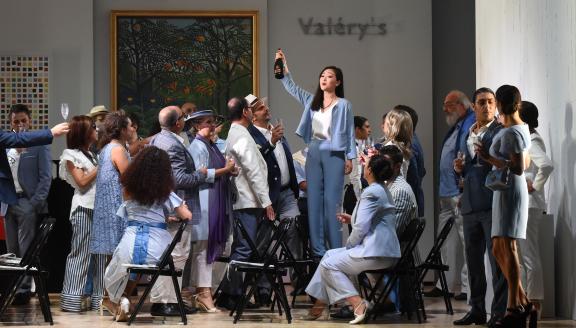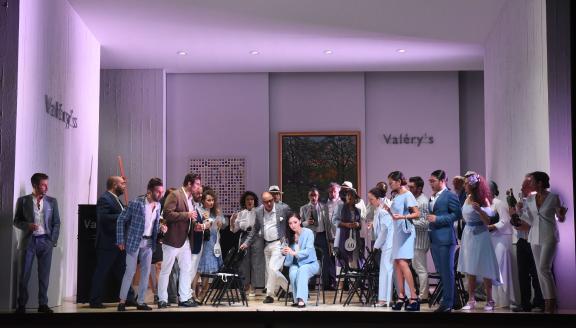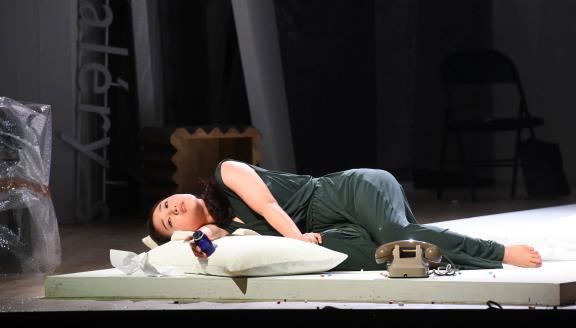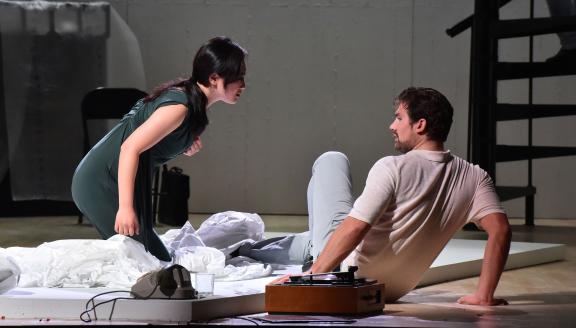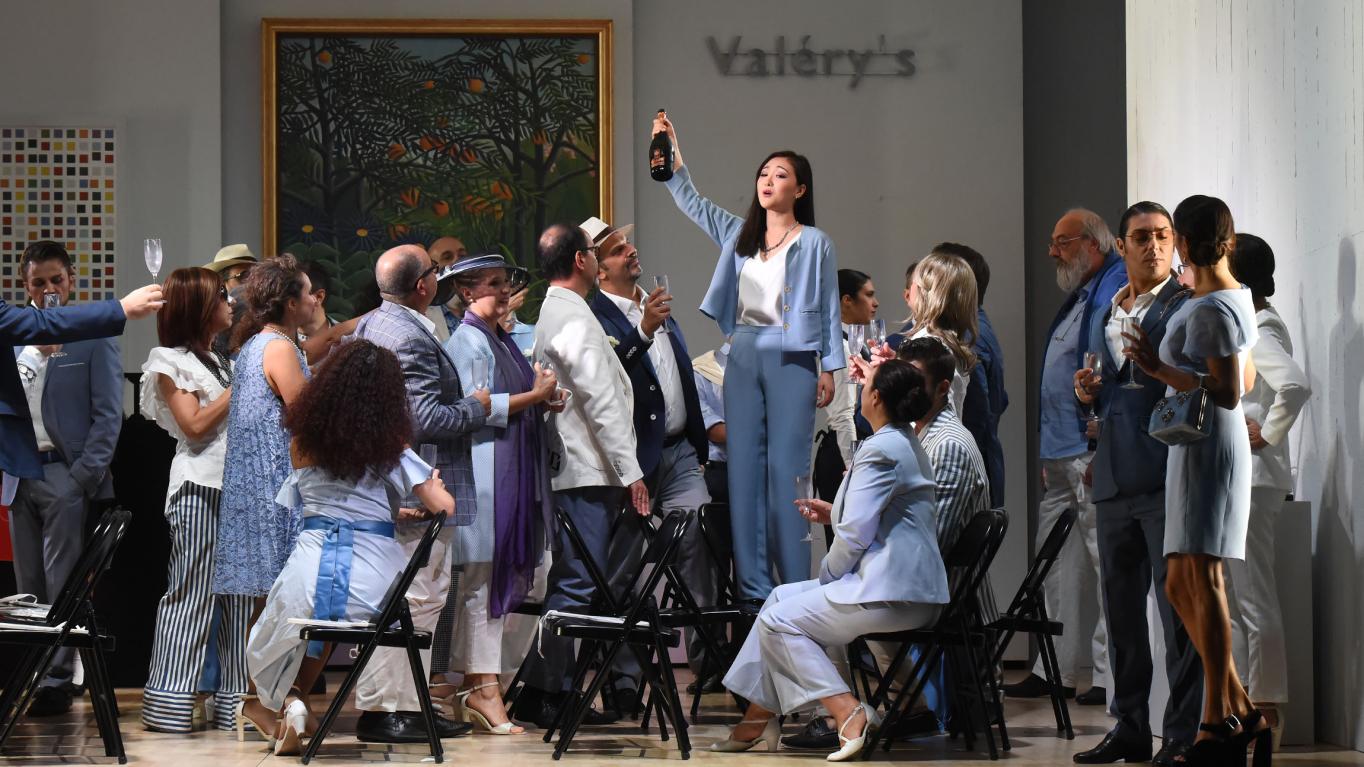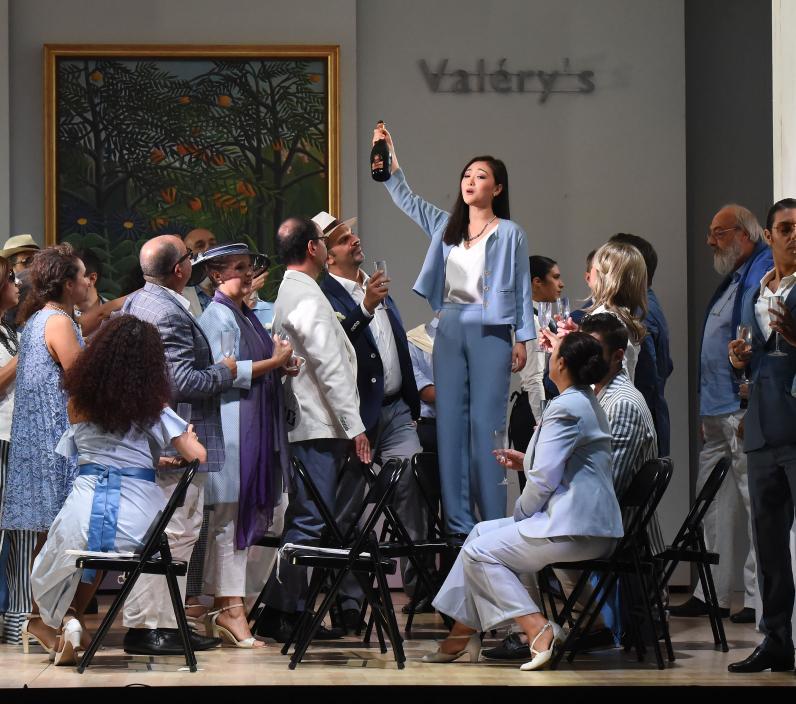

La traviata
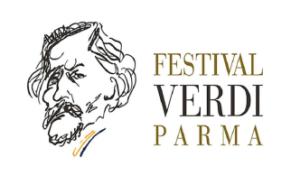
Experience one of the greatest operatic love stories of all time, as imagined by an award-winning team of young artists.
Cast
Violetta Valéry | Isabella Lee |
|---|---|
Alfredo | Alessandro Viola |
Flora Bervoix | Marta Leung |
Annina | Luisa Tambaro |
Giorgio Germont | Marcello Rosiello |
Gastone de Letorières | Paquale Scircoli |
Barone Douphol | Carlo Checchi |
Marchese d'Obigny | Claudio Levantino |
Dottor Grenvil | Gerard Farreras Gonzáles |
Giuseppe, Violetta's servant | Ugo Rosati |
Flora's servant | Sandro Pucci |
Commissioner | Raffaele Constantin |
Chorus | Teatro Comunale di Bologna |
Orchestra | Teatro Comunale di Bologna |
| ... | |
Music | Giuseppe Verdi |
|---|---|
Conductor | Sebastiano Rolli |
Director | Andrea Bernard |
Sets | Andrea Bernard, Alberto Beltrame |
Costumes | Elena Beccaro |
Text | Francesco Maria Piave. |
Chorus Master | Andrea Faidutti |
| ... | |
Video
The story
La Traviata is the chronicle of a tragedy foretold. It is also an account of a rise, a fall and a redemption. But above all, it is the story of a love larger than prejudice, larger than society, larger than life.
Act 1 is a party at the courtesan Violetta Valery’s apartment in Paris. Guests are still arriving. Gastone tells Violetta that the young Alfredo Germont is devoted to her. Alfredo is persuaded to lead a drinking song (‘Libiamo, ne’ lieti calici’) instead of her disgruntled lover Baron Douphol. A band announces dancing, but Violetta remains behind. Alfredo, noticing her pallor, urges her to give up her reckless life and declares his love (‘Un dì felice’). She mocks him, but is inwardly touched by his attention. Some guests return, and Alfredo is dismissed with an invitation to come back when the camellia flower she gives him has faded.The party is over, and Violetta, left alone, muses on the effect of Alfredo’s love (‘Ah, fors’ è lui’). But she decides to live for the present, despite the echo of Alfredo’s testament of love (‘Sempre libera’).
Act 2 begins three months later at Violetta’s country house. She and Alfredo are now living together. His happiness (‘De’ miei bollenti spiriti’) is jolted by the maid Annina telling him she has arranged for the sale of her mistress’s carriage. He leaves for Paris at once, to raise money on his own. Violetta comes in and refuses an invitation from her friend Flora Bervoix. A stranger is announced. It is Alfredo’s father, and his purpose is to persuade her to leave his errant son. She describes what she has given up for him. When Germont tells her the liaison threatens his daughter’s marriage, she protests that she does not have long to live. But he is adamant, and she resigns herself to the sacrifice, begging only that that the daughter be told of it, and Alfredo likewise, after her death (‘Dite alla giovine’). Alone, she writes a letter telling Alfredo that she has decided to return to Douphol. Suddenly Alfredo is there. She begs him to go on loving her (‘Amami, Alfredo’) and leaves. The servant tells him she has gone to Paris, and then he receives the letter. His father returns to console him (‘Di Provenza’), but he decides to follow her.
Later that evening, at Flora’s town house, the guests hear of Violetta and Alfredo's separation. Gastone provides entertainment. Alfredo arrives and begins gambling, then a distraught Violetta appears together with Douphol. A quarrel between the two men is prevented by the announcement of supper. Violetta has asked for a private word with Alfredo. She lies and says that she loves Douphol, and Alfredo insults her publicly by throwing his winnings at her feet. His father arrives and upbraids him for his cruelty.
Act 3 takes place six months later at Violetta’s Paris apartment, where she lays in bed dying. The doctor offers her hope, but tells Annina that the end is near. Violetta re-reads a letter from Germont promising Alfredo’s return. It is too late, and she despairs of her dreams (‘Addio del passato’). Outside there is a carnival, and it heralds Alfredo’s surprise arrival. For a short while they are reunited (‘Parigi, o cara’). Violetta now desperately wants to live, but her strength is failing. In the presence of a repentant Germont, she gives Alfredo an image of herself, and dies.
Insights
This production of La traviata has been realised by Andrea Bernard (stage director), Alberto Beltrame (set designer) and Elena Beccaro (costume designer), the winners of the European Opera Directing Prize 2016.
The European Opera Directing Prize is awarded by Camerata Nuova (http://camerata-nuova.com/) to help launch the carreer of young opera directors. In the following video, you can see how the finalists work on their production ideas for La traviata.
LA TRAVIATA, the auction of feelings
Thoughts from the director Andrea Bernard
Da questo palpito s'io t'ami impara, senza te esistere più non potrei (Let my emotion show you how much I love you, I could not live without you) - Alfredo, III act
This sentence in particular, sung by Alfredo to Violetta in the third act, has made me wonder about the importance of love relationships in the life of a person of today. We often hear about people who are unable to be alone; who, once they have terminated a relationship, are already looking for another. When this happens, where is the border between love for each other and selfishness?
This and other questions prompted me to read La traviata through the eyes of today’s individual, as did Verdi with his contemporaries before the intervention of censorship (which pushed back the setting to the 17th century). In an ever more individualistic world, is Alfredo and Violetta’s love true or is it only the manifestation of an affection they feel compelled to feel, to prove a point to themselves and to the rest of society?
Alfredo sees not just Violetta the woman, but also a gateway to high society, and he feels the need to prove to himself that he can do it even if he comes from a different social background. He pursues this ambition until the end and accepts, perhaps with only half-sincere regrets, Violetta’s premature death.
Frank and cynical Violetta is a woman who has successfully climbed the career ladder and answers to no one, and who has made sacrifices in order to reach her objectives. This has made her popular and surrounded by rich and influential men. Behind this strength lies insecurity due to an illness that pushes her away from everything and everyone. This illness becomes even stronger if considered as psychological, sustained by the medicines Violetta will stop taking and which will leave her in a state of non-being; of quasi-death.
She hopes that her love for Alfredo will be an opportunity for redemption, a way to show that she too is able to feel those emotions that make people fulfilled.
Sometimes people bluff: they fake and self-delude and profess love, but they do all this only to fill their feelings of emptiness. Thus, the love between Violetta and Alfredo becomes a selfish act. They commodify their relationship; they are using one another for sheer personal gain.
The only one to make the two face reality is Giorgio Germont. His arrival provokes a deep crisis for the couple, making them understand that their relationship is based on shaky foundations. At the end of the day, ‘man is often voluble’. So what would happen after the falling-in-love phase? Would they really be suited to each other? Germont himself, afraid to be alone and maybe to shield his son from an experience he might have lived when he was young, will try his best to impede the relationship.
This aspect of ‘commodification of feelings’ has driven our decision to set the scene in a contemporary auction house: a place of power, exchange, vain ambition and desire. The auction house is a changing space where art and feelings collide. As objects are evaluated and put up for auction, so are emotions. The quality and substance of an object are not as important here as how high a monetary value the buyer will place on it. The auction house becomes a symbol: a sort of emotional mask which shows others what the wearer wants to present.
